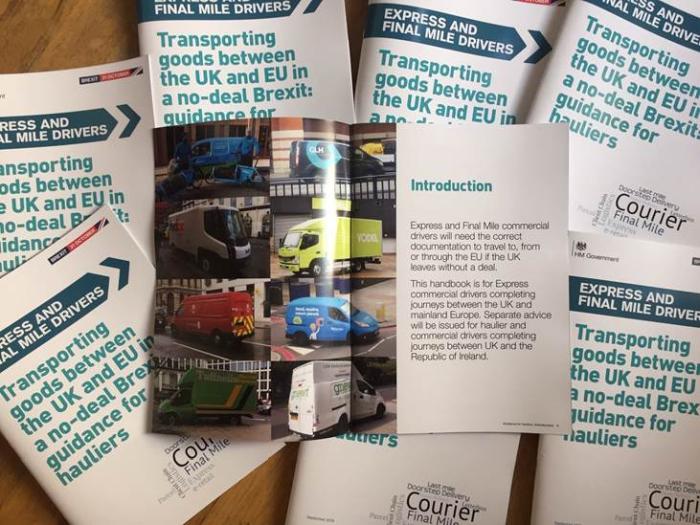
The Institute of Couriers is big on the internet for Brexit, but it's been round the table too.
‘Get Ready for Brexit’ campaign; fellows engaged in a series of roadshows, bringing together expertise from government departments including BEIS, Home Office, HMRC, DIT, DEFRA and DCMS, combining interactive support and in-depth advice sessions to help business of all sizes get ready for Brexit. The Institute of Couriers held a dedicated Express 'Ready for Brexit' meeting in Manchester on 30th October. It also produced this dedicated web bubble for the sector, a printed pamphlet for van driver distribution and also ran extensive extracts in the Institute's 'week ahead' Sunday sector email bulletins
Nov 5th 2021
Latest TSS Trader Bulletin here
March 9th 2021 Brexit is Over?
DfT hot off the press , Manston for Dover is suspended from March 21st
DfT report this week, From Sunday 21 March, all haulier processing operations, including COVID testing for hauliers, will be suspended at Manston Airport. If heading to the Port of Dover or Eurotunnel, you will be directed straight onto to the M20.
Free COVID testing for hauliers is still available at one of the many Information and Advice sites. Inland Border Facility checks will continue to be processed by Ashford Sevington or one of the other sites across the country.
You are strongly encouraged to get a negative COVID-19 test, to use the Check an HGV is Ready to Cross the Border service and get a valid Kent Access Permit before arriving in Kent to minimise delays.
January 18th UPS advice for shippers post-Brexit
Ufku Akaltan, president East Europe District, ‘After successfully reaching a post-Brexit trade agreement, the EU and the United Kingdom started the New Year as partners who share a common history. But the agreement does not mean "business as usual", my notes below will guide you through Brexit and help you on your journey towards a new trading landscape.’
What does the Brexit deal mean for your shipments?
On 24 December 2020, the United Kingdom and the European Union reached a post-Brexit trade agreement. But the deal doesn’t mean ‘business as usual’ for shipping between the UK and the EU. Tariffs, such as import duty, will be eliminated on the trade of products shipped between the UK and the EU from 1 January 2021, depending on the origin of the goods. However, even with this deal in place, businesses and carriers will now face more paperwork and administration when shipping, meaning increased costs and adjustments to supply chains. Customs clearance will now be required for all goods moving between the UK and the EU, including for return shipments. You will need to declare the goods you are sending by completing a commercial invoice. You will also need to follow the revised VAT rules.
This page will guide you through Brexit and help you on your journey towards a new trading landscape.
Your Brexit-Ready Toolkit - The Basic Requirements
Start with the following basic steps to keep your goods moving as smoothly as possible.
Register for an EORI number in the UK and the EU
An Economic Operator’s Registration and Identification (EORI) number will be required to continue trading between the UK and the EU in the event of a customs border.
VAT Registration
As of 1 January, 2021, shippers selling goods valued at or below £135 into the UK will be responsible for collecting and paying UK VAT for these shipments. The VAT amount should be collected at the point of sale and paid to HMRC through the UK VAT registration.
For goods sold into the UK valued above £135, the importer will remain responsible for paying the UK VAT. This can be paid by the importer via postponed VAT accounting or through the customs declaration.
If your UK business is importing on its own name into the EU, you need to be VAT registered in the EU. We recommend you do this in the country of clearance.
Appoint an Importer of Record (IOR) if the consignee is not the declarant
The IOR is responsible and liable for your customs declarations. For UK businesses exporting to the EU this can either be an EU-based subsidiary if they are part of the transaction or an EU-based customs broker.
Moving goods to and from Northern Ireland. Northern Ireland will remain aligned to a limited set of EU rules. Goods shipped between the EU to Northern Ireland will move as an intra-Union movement. This means there will be no customs supervision, controls or formalities.
Origin of goods
To benefit from preferential tariffs, the products you are shipping must originate in the UK or the EU. You will need to include proof of origin of goods with the commercial invoice or other commercial documentation (excluding a bill of lading). You can self-declare the origin of goods for the first year.
Agri-food consignments
Agri-food consignments will require health certificates and undergo sanitary and phytosanitary controls at border inspection posts. Therefore, in order to avoid disruption at the land border, some restricted commodities can only be shipped using UPS Express services. They will still be inspected, but at other locations. It is your responsibility as the shipper to check the regulations and whether your goods will require inspection.
